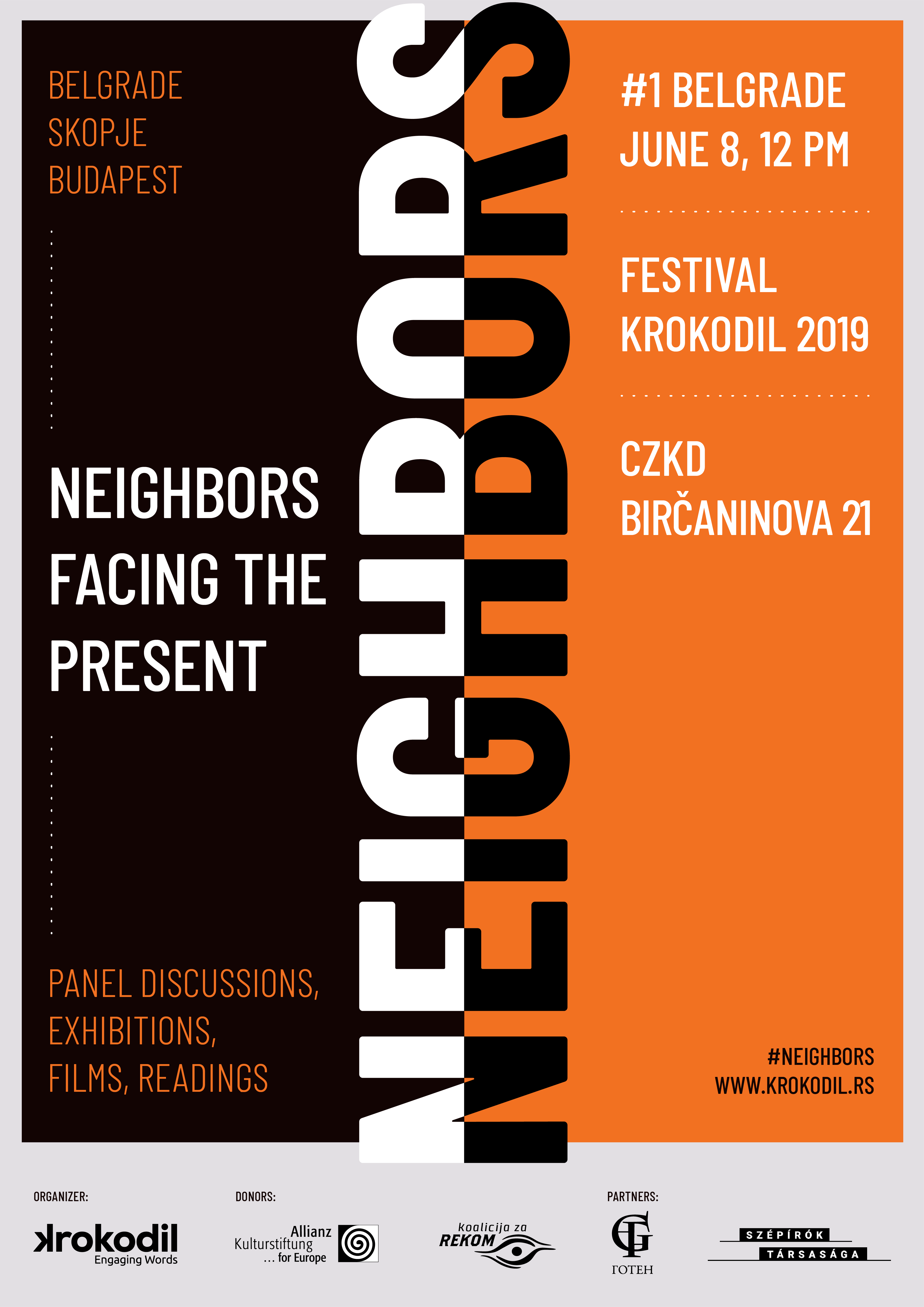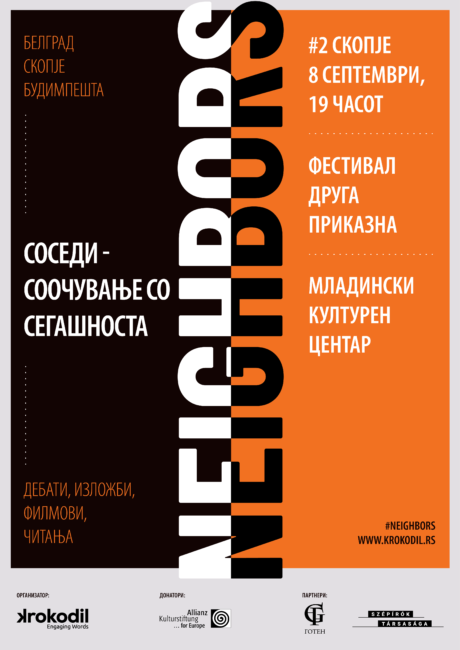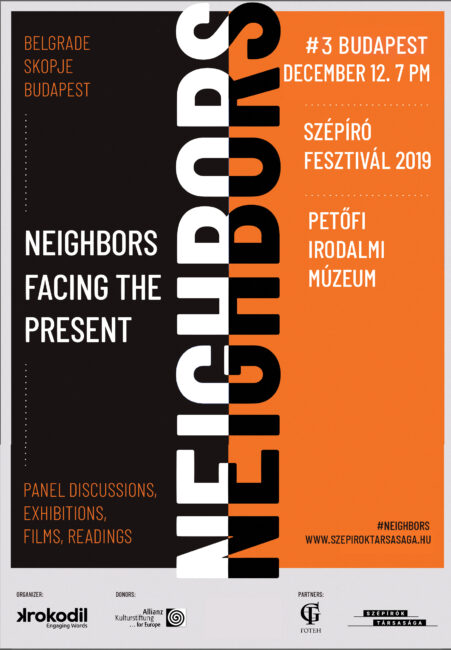
23 May Neighbors – Facing the Present Debate program, Festival KROKODIL
PANEL DISCUSSION #1, BELGRADE
Neighbors facing the present
Panel discussion with photo exhibition and film projection
Saturday June 8th 12PM, Center for Cultural Decontaminiation, 21 Birčaninova st., Belgrade
Panelists: Lana Bastašić (BiH), Rumena Bužarovska (NMK), Ferenc Cinki (HU), Kozmin Perca (RU), Georgi Gospodinov (BG)
Moderation: Mima Simić (HR)
Photos: Igor Čoko
“Untravel” film by Nikola Majdak and Ana Nedeljković
Rise of right-wing politics changes Europe. In recent years, the resurgence of nationalism across the E.U. has become so powerful that parties from the political mainstream have been forced to tilt sharply to the right as well, often retreating from their core principles of tolerance, openness and diversity. Countries in the formerly communist East have been hit especially hard by factory closures, high unemployment and an exodus of young workers to the wealthier states of Western Europe. By applying politics of fear, conservative “ghosts” along the Danube have been able to capitalize not only on fears of migration but also on angst over economic inequality.
Recent polls show that the conservative, anti-mass migration governing parties of Hungary and Poland are receiving record support as EU unity on immigration continues to crumble. Europe has been at the forefront of the resurgence of patriotic, selfdeterminism in mainland Europe. In January, Croatia joined Austria, Hungary, Poland, the Czech Republic, and Slovakia in rejecting the EU’s migrant quotas and for standing up for a sovereign nation’s right to protect her borders and decide who enters. Closing borders poses an imminent violation of human rights guaranteed by the Geneva Convention and represents serious humanitarian question that touches the core values of the Western civilization itself.
What, if any, is the social or political responsibility of the artist? Or, to put it another way: should writers be writing for a cause? Can artists jointly drive a healthy social change in their local communities? And last but certainly not the least: is present important enough to be faced in the region where facing the past is still the biggest challenge and/or obstacle?
The main aim of the project “NEIGHBORS – Facing the Present” is to engage authors but also other artists and intellectuals in intense debate about the present circumstances in different countries of the region (Hungary, Serbia, Macedonia) in order to influence the development of literary and arts connections, open borders, as well as to empower those that are interested in culture as such, to promote culture of dialogue, reconciliation and reconstruction of the broken links particularly in the region of the Western Balkans in relation with Central Europe and the surrounding EU-countries following the sharp rise of conservativism and the new wave of ethnic and national withdrawal and protectionism motivated by the economic crisis as well as migratory waves from the Middle East via Balkan route (Greece-Macedonia-Serbia-Hungary) towards the more politically and economically stable countries of Western Europe.
Project is supported by the Allianzkulturstiftung and realised under the project CSO activism for regional reconsiliation in the former Yugoslavia – In Support of RECOM, supported by the European Union.
PANEL DISCUSSION #2, SKOPJE
СОСЕДИ – СООЧУВАЊЕ СО СЕГАШНОСТА ФЕСТИВАЛ „ДРУГА ПРИКАЗНА“

Соседи – соочување со сегашноста
Недела, 8 септември, 19.00, Младински културен центар, Скопје, РС Македонија
Учесници: Искра Гешоска (РС Македонија), Ана Недељковиќ (Србија), Румена Бужаровска (РС Македонија), Денеш Крушовски (Унгарија)
Фотографии: Игор Чоко
Untravel, филм на Никола Мајдак и Ана Недељковиќ
Модератор: Владимир Јанковски
Во последните години, оживувањето на национализмот во земјите од Европската Унија стана толку силно што партиите од политичкиот мејнстрим се принудени да се свртат кон десницата, често отстапувајќи од своите суштински принципи на толеранција, отвореност и разноликост. Особено се погодени земјите од поранешниот комунистички блок, поради нивната слаба економска состојба и егзодусот на младите кон побогатите земји од Западна Европа. Со спроведување на политиката на страв, конзервативните „духови“ успеаја да профитираат не само од политиката на стравот туку и од незадоволството од економската нееднаквост. Најновите анкети покажуваат дека конзервативните, антимиграциски владејачки партии во Унгарија и Полска добиваат рекордна поддршка додека обединетоста на Европската Унија во врска со прашањето на имигрантите продолжува да слабее. Затворањето на границите претставува загрижувачко нарушување на човековите права гарантирани од Женевската конвенција и поставува сериозни хуманитарни прашања кои се однесуваат на суштинските вредности на западната цивилизација.
Во овој контекст, каква е политичката одговорност на уметникот? Или да го поставиме прашањето на поинаков начин: дали писателите мораат да пишуваат за одредена кауза? Дали уметниците заеднички можат да поттикнат здрави општествени промени во нивните локални заедници? Конечно, дали сегашноста е доволно важна за да се соочиме со неа во регионот каде што соочувањето со минатото сè уште е еден од најголемите предизвици и/или пречки?
Главната цел на проектот „Соседи – соочување со сегашноста“ е да ги вклучи уметниците и интелектуалците во интензивна дебата за современите околности во различни земји во регионот (Унгарија, Србија, Македонија) со цел да се влијае врз развојот на литературните и уметнички релации, отворањето на границите, како и да ги засили оние што се заинтересирани за културата, да ја промовира културата на дијалогот, помирувањето и повторното изградување на скршените врски особено во регионот на Западниот Балкан во релацијата со Централна Европа и земјите од Европската Унија од соседството, во момент на силен подем на конзервативизмот и новиот бран на етничко и национално повлекување поттикнати од економската криза и миграциските бранови од Средниот Исток низ Балканската рута (Грција-Македонија-Србија-Унгарија) кон политички и економски постабилните земји од Западна Европа.
Проектот „Соседи – соочување со сегашноста“ е партнерски проект на издавачката куќа Готен, здружението КРОКОДИЛ од Србија и здружението „Сепирок“ од Унгарија. Проектот се реализира со поддршка на фондацијата „Алијанс“.
PANEL DISCUSSION #3, BUDAPEST
NEIGHBORS FACING THE PRESENT DEBATE AT Szépíró Fesztivál

Neighbors facing the present
Panel discussion with photo exhibition and film projection
ThursdayDecember12th 7PM, Petőfi Literary Museum, 16Károlyi st., Budapest
Panelists: Igor Coko (Serbia), Iskra Geshoska (Macedonia), László Szűcs (Romania), Pál Száz (Slovakia), Tibor Babiczky, Márton Simon (Hungary)
Moderation: Anna Gács (Hungary)
Photos: Igor Čoko
“Untravel” film by Nikola Majdak and Ana Nedeljković
Rise of right-wing politics changes Europe. In recent years, the resurgence of nationalism across the E.U. has become so powerful that parties from the political mainstream have been forced to tilt sharply to the right as well, often retreating from their core principles of tolerance, openness and diversity. Countries in the formerly communist East have been hit especially hard by factory closures, high unemployment and an exodus of young workers to the wealthier states of Western Europe. By applying politics of fear, conservative “ghosts” along the Danube have been able to capitalize not only on fears of migration but also on angst over economic inequality.
Recent polls show that the conservative, anti-mass migration governing parties of Hungary and Poland are receiving record support as EU unity on immigration continues to crumble. Europe has been at the forefront of the resurgence of patriotic, selfdeterminism in mainland Europe. In January, Croatia joined Austria, Hungary, Poland, the Czech Republic, and Slovakia in rejecting the EU’s migrant quotas and for standing up for a sovereign nation’s right to protect her borders and decide who enters. Closing borders poses an imminent violation of human rights guaranteed by the Geneva Convention and represents serious humanitarian question that touches the core values of the Western civilization itself.
What, if any, is the social or political responsibility of the artist? Or, to put it another way: should writers be writing for a cause? Can artists jointly drive a healthy social change in their local communities? And last but certainly not the least: is present important enough to be faced in the region where facing the past is still the biggest challenge and/or obstacle?
The main aim of the project “NEIGHBORS – Facing the Present” is to engage authors but also other artists and intellectuals in intense debate about the present circumstances in different countries of the region (Hungary, Serbia, Macedonia) in order to influence the development of literary and arts connections, open borders, as well as to empower those that are interested in culture as such, to promote culture of dialogue, reconciliation and reconstruction of the broken links particularly in the region of the Western Balkans in relation with Central Europe and the surrounding EU-countries following the sharp rise of conservativism and the new wave of ethnic and national withdrawal and protectionism motivated by the economic crisis as well as migratory waves from the Middle East via Balkan route (Greece-Macedonia-Serbia-Hungary) towards the more politically and economically stable countries of Western Europe.
Project is supported by the Allianzkulturstiftung and realised under the project CSO activism for regional reconsiliation in the former Yugoslavia – In Support of RECOM, supported by the European Union.


